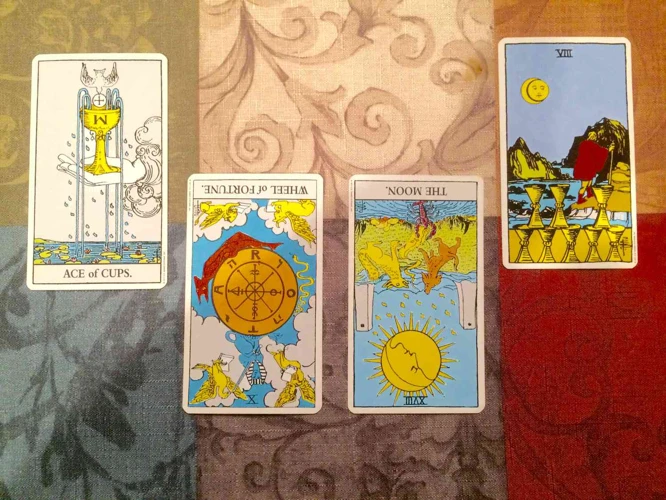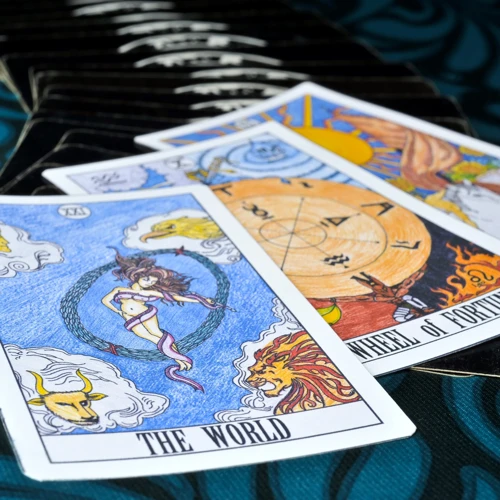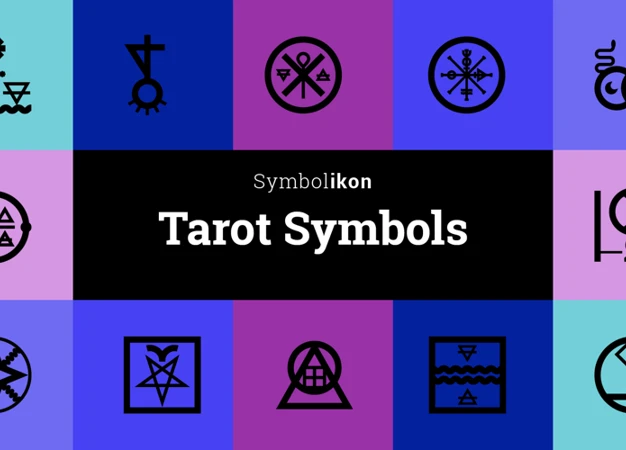Decoding the Hidden Messages: Symbols in Reversed Tarot Cards
Unveiling the enigmatic world of tarot cards opens up a plethora of mysteries waiting to be deciphered. From the intriguing symbolism to the deeper meanings, each card carries a unique message. But what happens when these cards are reversed? Delving into the realm of reversed tarot cards unravels a whole new layer of hidden messages and revelations. In this article, we will explore the significance of reversed tarot cards, understand how to interpret the symbols in these cards, and unravel the techniques for decoding their profound meanings. Get ready to embark on a journey of discovery as we unravel the secrets contained within the reversed tarot cards.
Contents
The Significance of Reversed Tarot Cards

The Significance of Reversed Tarot Cards
Understanding the world of tarot cards goes beyond their upright positions. When a card is reversed, it takes on a whole new significance, adding layers of complexity to the interpretation. Reversed tarot cards represent a shift in energy, a deviation from the normal flow of meaning. They can indicate obstacles, blockages, or delays in the unfolding of events. Reversals provide a unique perspective, forcing us to examine situations from a different angle and consider alternative possibilities. These cards challenge us to explore the shadow side of the symbolism and delve into the depths of our psyche. They offer a valuable opportunity for introspection and self-reflection, pushing us to confront unresolved issues and hidden truths. Reversed tarot cards serve as a reminder that life is not always straightforward and that we must embrace both the light and the darkness to gain a holistic understanding of our journey. By diving deeper into the meanings of these cards, we can uncover profound insights and navigate through the complexities of life with greater wisdom and clarity.
Understanding Reversed Cards
Understanding Reversed Cards
Reversed cards in tarot can be seen as mirrors reflecting a change in energy or a contrast to the upright meanings. When a card appears upside down, it alters the interpretation, suggesting a shift in the card’s traditional symbolism. To truly understand reversed cards, it is essential to examine both their individual meanings and how they relate to the surrounding cards in a spread. Reversed cards often indicate a disruption in the flow of energy, highlighting challenges, obstacles, or internal conflicts. They can represent suppressed emotions or unresolved issues that need attention. While reversed cards generally carry a more challenging connotation, they also offer a unique opportunity for growth and transformation. They urge us to explore the opposite aspects of the card’s upright meaning, bringing attention to hidden insights, subconscious influences, and alternative perspectives. By acknowledging and embracing the complexities inherent in reversed cards, we can gain a deeper understanding of ourselves, our circumstances, and the energies at play. To explore the power of reversal symbolism in tarot cards, visit power-reversal-symbolism-tarot-cards. Through this exploration, we can unlock the profound wisdom and contradictions that lie within reversed tarot cards.
Interpreting Symbols in Reversed Tarot Cards
Interpreting Symbols in Reversed Tarot Cards
When it comes to interpreting symbols in reversed tarot cards, a nuanced approach is necessary. Unlike the upright position, where symbols often have clear and positive meanings, reversed symbols introduce a sense of contradiction and deviation from the norm. Here are some key considerations when deciphering the symbolism in reversed tarot cards:
1. Context: Start by looking at the surrounding cards and the overall spread. The context can provide clues as to how the reversed symbol is influencing the reading. Is it contrasting with the other cards or adding depth to their interpretations?
2. Opposite Meanings: In many cases, reversed symbols represent the opposite of their upright meanings. For example, a sword symbolizing power and action in its upright position might signify a loss of power or lack of direction when reversed. Emphasize the contrasting qualities and reflect on the implications.
3. Blocked Energy: Reversed symbols often indicate blocked energy or obstacles in the situation at hand. They serve as reminders to navigate challenges and address any underlying issues that may be hindering progress.
4. Intuition and Personal Connection: Trust your intuition when interpreting reversed symbols. Allow your inner wisdom to guide you in understanding the symbol’s significance in relation to the question or situation being explored.
5. Symbolic Contradictions: Reversed symbols invite a deeper exploration of contradictions. They encourage us to consider the hidden aspects and complex layers of a situation. Pay attention to the tensions and paradoxes within the symbolism and explore their significance.
6. Personal Associations: Symbols in reversed tarot cards can also have personal associations based on the reader’s experiences, beliefs, and cultural background. Consider how these individual interpretations tie into the broader symbolism.
Remember, interpreting symbols in reversed tarot cards is an art that requires both analytical thinking and intuitive insights. By embracing the inherent contradiction and diving into the art of deciphering reversed symbolism, you can uncover profound meanings and enhance the depth of your tarot readings.
Common Symbols and Their Reversed Meanings
Common Symbols and Their Reversed Meanings
Symbols play a crucial role in tarot readings, and when these symbols appear in reversed cards, their meanings take on a distinct twist. Let’s explore some of the common symbols in tarot cards and their reversed interpretations. The sun, which represents joy, vitality, and positivity in its upright position, may signify a temporary loss of enthusiasm or a lack of energy when reversed. The moon, associated with intuition and the subconscious mind, can indicate hidden fears or confusion when reversed. The tower, symbolizing change and upheaval, takes on a more intense meaning when reversed, suggesting a resistance to transformation or a crumbling of structures that were once secure. Similarly, the reversed meaning of the fool, representing new beginnings and spontaneity, may indicate recklessness or a fear of taking risks. These are just a few examples, but it’s important to remember that the reversed meanings of symbols may vary depending on the context and the surrounding cards in a reading. By paying attention to the nuanced interpretations of these symbols, we can unlock deeper insights into the messages hidden within the reversed tarot cards.
Techniques for Decoding Symbols in Reversed Tarot Cards
Techniques for Decoding Symbols in Reversed Tarot Cards
Deciphering the symbols in reversed tarot cards requires a careful and intuitive approach. Here are some effective techniques to help unravel their hidden meanings:
1. Symbolic Contrast: Pay attention to the contrasting elements between the upright and reversed cards. Analyze how the symbolism shifts and what it may indicate. The reversal of a symbol can suggest a negation, a disruption, or a different interpretation altogether.
2. Contextual Analysis: Consider the surrounding cards and the overall reading when interpreting reversed symbols. Take into account the card’s position, neighboring cards, and the theme of the spread. This holistic approach provides valuable context for understanding the reversed symbolism.
3. Emotional Guidance: Engage with your emotions and intuition when interpreting reversed symbols. Notice the emotional response a particular card evokes and explore its implications. Emotions often hold valuable clues and insights into the meaning behind the cards.
4. Personal Associations: Connect the symbols in reversed cards with your personal experiences, memories, and associations. Consider how these symbols resonate with your own life journey and the situations you are currently facing. This introspective approach can provide unique insights tailored to your individual circumstances.
5. Journaling and Reflection: Maintain a tarot journal to record your interpretations of reversed symbols. Reflect on your readings and revisit them over time to deepen your understanding. Journaling allows you to track patterns, uncover new insights, and refine your decoding techniques.
Remember, there are no strict rules when it comes to interpreting reversed tarot cards. Each reader has their own style and intuitive process. By combining these techniques and trusting your intuition, you can unlock the profound meanings concealed within the symbols of reversed tarot cards.
Deciphering the Symbols in Reversed Major Arcana Cards

Deciphering the Symbols in Reversed Major Arcana Cards
The Major Arcana cards hold immense significance in the tarot deck, representing powerful archetypal energies and major life events. When these cards appear in a reversed position, their symbols take on a nuanced meaning that can provide valuable insights into our lives. Let’s explore some of these reversed Major Arcana cards and their hidden symbolism:
1. The Fool: In its reversed form, The Fool represents recklessness, impulsiveness, or missed opportunities. It urges caution and encourages careful assessment before leaping into new ventures.
2. The Magician: Reversed, The Magician suggests manipulation, trickery, or an abuse of power. It advises us to be cautious of illusions and deceit in our dealings.
3. The High Priestess: When reversed, The High Priestess may signify hidden agendas, secrets, or a lack of intuition. It calls for us to trust our instincts and seek deeper meaning beneath the surface.
4. The Empress: Reversed, The Empress can indicate neglect, overindulgence, or creative blockages. It prompts us to nurture ourselves and find balance in our emotional and creative endeavors.
5. The Emperor: In its reversed state, The Emperor represents a lack of control, authority, or structure. It encourages us to regain stability and establish boundaries.
6. The Hierophant: Reversed, The Hierophant signifies rebellion against traditional beliefs, dogma, or conformity. It calls for us to explore our own spirituality and challenge established systems.
7. The Lovers: In its reversed position, The Lovers might indicate disharmony, conflict, or difficult choices. It advises us to consider the consequences of our actions and prioritize open and honest communication.
8. The Chariot: Reversed, The Chariot warns against feeling out of control, lack of direction, or setbacks. It reminds us to stay focused and disciplined in our pursuits.
9. Justice: When reversed, Justice suggests injustice, imbalance, or unfairness. It encourages us to seek fairness and restore equilibrium in our lives.
10. The Hermit: In its reversed form, The Hermit may signify isolation, withdrawal, or a fear of solitude. It prompts us to seek inner guidance and introspection.
Understanding the symbols in reversed Major Arcana cards requires a deep exploration of their archetypal meanings. By embracing the complexities of these cards, we can gain a deeper understanding of ourselves and navigate through life’s challenges with wisdom and insight.
The Fool
The Fool
In reversed tarot cards, The Fool represents a sense of foolishness or naivety. This card symbolizes taking unnecessary risks without considering the consequences. When reversed, The Fool advises caution and urges us to think before we act. It signifies recklessness and impulsive behavior that may lead to negative outcomes. It serves as a reminder to pause, reflect on our actions, and assess the potential consequences before moving forward. Reversed, The Fool highlights the need to be more responsible and grounded in our decision-making. It encourages us to learn from past mistakes and approach situations with a greater sense of awareness. Instead of blindly jumping into new adventures, this card suggests taking calculated risks and making informed choices. By acknowledging the reversed symbolism of The Fool, we can navigate through life’s uncertainties with a greater sense of wisdom and avoid unnecessary missteps.
The Magician
The Magician is a powerful archetype in the tarot deck, representing the ability to manifest and transform energy. When reversed, the symbolism of The Magician takes on a different meaning. In this context, The Magician reversed indicates a misuse of power or manipulation. It suggests that one may be engaging in deceitful tactics or attempting to control others for personal gain. The reversed Magician warns against being swayed by trickery or falling victim to deception. It serves as a reminder to be cautious of those who may be using their skills and talents for negative purposes. Additionally, The Magician reversed can also signify a lack of focus or direction. It suggests a period of uncertainty and confusion, where one’s creative energies may feel blocked or scattered. It is essential to reassess one’s goals and intentions and to find a renewed sense of purpose. The reversed Magician invites individuals to harness their inner power responsibly, to avoid manipulative behavior, and to seek clarity and purpose in their actions. By recognizing and addressing the symbolism of The Magician in its reversed position, one can navigate through challenges and strive for authenticity and integrity in their endeavors.
The High Priestess
The High Priestess is a card rich in symbolism and mystique. When this card appears in a reversed position, its meaning takes on a new dimension. Reversed, The High Priestess suggests a lack of intuition and inner guidance. It indicates a need to reconnect with one’s inner wisdom and trust in one’s instincts. The reversed High Priestess may be a sign of ignoring or suppressing one’s intuition, leading to disconnection from one’s true spiritual path. It reminds us to find balance and harmony between the conscious and subconscious aspects of ourselves. The reversed High Priestess may also represent hidden knowledge or secrets that are being kept, urging us to explore deeper and uncover the truth. This card signifies the necessity to tap into our intuition, develop our psychic abilities, and embrace the mysteries of life. It encourages us to trust our inner voice and listen to the subconscious messages that may be trying to guide us. When interpreting the reversed High Priestess, it is important to pay attention to the emotions and fears that may be holding us back from embracing our true intuitive nature. By taking the time to reflect, meditate, and explore our inner world, we can harness the power of the High Priestess, even in her reversed form, and gain profound insights into our own spiritual journey.
The Empress
The Empress
In reversed tarot readings, The Empress takes on a different meaning, highlighting elements of stagnation, lack of nurturing, or blocked creativity. Let’s explore the symbolic significance of The Empress in its reversed state:
1. Blocked Creativity: The Empress is a symbol of creativity and abundance. However, when reversed, it may indicate a creative blockage or a lack of inspiration. It suggests a need to reconnect with one’s creative energy and explore new avenues of self-expression.
2. Neglecting Self-Care: Reversed, The Empress can signify neglecting self-care or failing to prioritize one’s own well-being. It serves as a gentle reminder to nurture oneself and establish a sense of balance between giving and receiving.
3. Financial Instability: The Empress represents wealth and abundance. When it appears reversed, it can indicate financial instability or overspending. It advises reevaluating one’s financial choices and finding ways to manage resources more responsibly.
4. Lack of Nurturing: The Empress reflects maternal instincts and nurturing qualities. In reverse, it may indicate a lack of nurturing, either towards oneself or towards others. It suggests the need to cultivate compassion and create a supportive environment for personal growth.
5. Reproductive Issues: The Empress also symbolizes fertility and motherhood. Reversed, it could suggest difficulties or challenges related to pregnancy, fertility, or caring for children. It encourages seeking support and exploring alternative options.
When interpreting The Empress in its reversed state, it is important to consider the surrounding cards and the specific context of the reading. These insights provide a glimpse into the intricate world of reversed tarot cards, revealing deeper layers of meaning and guiding us towards a more profound understanding of ourselves and our journeys.
The Emperor
The Emperor
In the realm of reversed tarot cards, The Emperor takes on a different essence and meaning. While the upright position represents authority, structure, and stability, the reversed Emperor challenges these traditional notions. When The Emperor appears in a reversed position, it signifies a misuse or abuse of power. It suggests a lack of control, an overbearing persona, or a dictatorial attitude. The reversed Emperor warns against the excessive imposition of rules and dominance over others. It may point to issues with authority figures or a struggle for personal power and control. The reversed Emperor can serve as a reminder to reassess our own sense of power and leadership. It encourages us to explore whether we are using our influence for the greater good or for self-serving purposes. This card urges us to find balance in our approach to power, to be mindful of how our actions affect those around us. It reminds us that true leadership is not about asserting dominance but about inspiring and guiding others with wisdom and compassion. By reflecting on the reversed Emperor, we can learn to harness our power more responsibly and create a harmonious environment in our personal and professional lives.
The Hierophant
The Hierophant
In the realm of tarot, the Hierophant holds a position of authority and wisdom. In its upright position, this card represents tradition, dogma, and conformity. However, when the Hierophant appears in a reversed position, its symbolism takes on a different meaning. Reversed, the Hierophant suggests a rebellion against traditional beliefs or a questioning of established institutions. It encourages individuals to challenge existing structures and seek their own spiritual path. This reversed card can signify a need for personal growth and exploration outside of societal norms. It prompts us to question the status quo and find our own inner truth, even if it means breaking away from the teachings and expectations imposed upon us. The reversed Hierophant encourages us to embrace our individuality and trust our own intuition. It offers a powerful reminder that we have the freedom to redefine our beliefs and forge our own spiritual journey. By heeding the message of the reversed Hierophant, we can embark on a path of self-discovery and personal liberation, allowing us to navigate the complexities of life with authenticity and integrity.
The Lovers
The Lovers
In the realm of tarot cards, the Lovers card represents the union of two souls, symbolic of love and relationships. When this card appears in a reversed position, it indicates a disruption or disharmony in matters of the heart. It may suggest a conflict or a difficult choice between two paths. The reversed Lovers card prompts us to examine our relationships and question the foundations upon which they are built. It urges us to address any issues or imbalances that may be present. In a reversed interpretation, the Lovers card serves as a reminder to listen to our inner voice and make decisions based on authenticity and integrity. It prompts us to reflect on our values and ensure that our choices align with our true desires. It may also indicate the need for healing or seeking resolution in a troubled relationship. While the reversed Lovers card suggests temporary setbacks or challenges in matters of love, it also presents an opportunity for growth and transformation. By addressing the underlying issues and making conscious choices, we can navigate through the complexities of relationships and find harmony and fulfillment.
The Chariot
The Chariot
When The Chariot appears in a reversed position, its symbolism takes on a unique significance. Traditionally, The Chariot represents victory, triumph, and the ability to overcome challenges. However, in reverse, it may indicate a lack of direction or control. The Chariot in reverse suggests a struggle for power or a feeling of being pulled in different directions. It symbolizes a need to find balance and regain control over one’s life. This reversal could signify a lack of confidence, indecision, or a tendency to be impulsive. It serves as a reminder to reassess priorities and align with one’s true purpose. It may also call for introspection into what is truly driving one’s actions and motivations. In the reversed position, The Chariot urges individuals to pause, reflect, and regain their inner strength and determination. It’s a symbol of the need to find inner harmony and regain control over life’s journey. By acknowledging and addressing the challenges presented by The Chariot in reverse, individuals can steer themselves back on track towards personal growth and success.
Justice
Justice
In the realm of reversed tarot cards, the Justice card takes on a unique symbolism that invites us to examine the concept of balance, fairness, and karmic consequences. When Justice appears in a reversed position, it suggests a disruption in the natural order of things. It may indicate a lack of fairness, dishonesty, or an unfair advantage being taken. It is a reminder that actions have consequences and that the scales must be balanced. In a reversed Justice card, there may be a need for introspection and self-reflection, acknowledging any personal biases or prejudices that may be influencing our judgments. It prompts us to reassess our values and principles, ensuring that we are acting with integrity and honesty. The reversed Justice card can also indicate a delay in receiving justice or resolution to a situation. It calls for patience and perseverance as we navigate through legal or ethical matters. This card serves as a reminder that true justice may take time to manifest, but in the end, fairness will prevail. By carefully examining the symbolism within the reversed Justice card, we can gain valuable insights into the complexities of morality and fairness, guiding us towards a more balanced and just existence.
The Hermit
The Hermit
In the realm of reversed tarot cards, The Hermit takes on a new significance that deviates from its upright meaning. While The Hermit in the upright position symbolizes introspection, solitude, and a search for wisdom, in its reversed form, it can represent isolation, loneliness, and withdrawal from society. The reversed Hermit suggests a period of self-imposed isolation or a reluctance to engage with others. It may indicate a need for introspection that has turned into isolationism, causing a disconnection from the world and hindering personal growth. This card encourages us to examine whether our desire for solitude is serving our highest good or if it has become a form of escapism. It may serve as a gentle nudge to seek support and guidance from others, reminding us that we don’t have to navigate through life’s challenges alone. Additionally, the reversed Hermit can also signify a reluctance to share one’s wisdom or gifts with others, hoarding knowledge and experiences instead of sharing them for the benefit of all. It urges us to consider how we can use our wisdom and insights to contribute positively to the world around us. The reversed Hermit challenges us to strike a balance between personal introspection and meaningful connection with others. By embracing this duality, we can find enlightenment not only within ourselves but also in the collective experience of humanity.
Wheel of Fortune
The Wheel of Fortune card in reversed position brings forth a unique set of symbols and meanings. This card symbolizes the cyclical nature of life and the ever-changing wheel of fate. When reversed, it suggests a disruption in the natural flow and a lack of control over one’s destiny. It signifies a period of uncertainty and unpredictability. The symbolism of the wheel itself, with its spokes and turning motion, represents the ups and downs of life. In the reversed position, it may indicate a period of stagnation or a delay in progress. It could also suggest missed opportunities or a lack of favorable circumstances. The Wheel of Fortune reversed encourages us to reflect on the choices we have made and to take responsibility for the outcomes. It calls for adaptation, resilience, and the willingness to embrace change. This card serves as a reminder that even in times of challenge and adversity, there is the potential for growth and transformation. By diving deeper into the symbolism of the reversed Wheel of Fortune, we can gain insights into how to navigate through uncertain times and find our footing on the ever-turning wheel of life.
Strength
Strength
In the realm of tarot, the Strength card represents courage, resilience, and inner fortitude. When this card appears in reverse, its symbolism takes on a slightly different meaning. Reversed Strength suggests a loss of control or a struggle to harness one’s inner power. It may indicate moments of self-doubt, insecurity, or a lack of confidence in one’s abilities. This reversed card encourages us to reflect on the areas of our lives where we feel weakened or where we may be avoiding confrontation or difficult situations. It serves as a reminder that true strength comes from vulnerability and embracing our fears rather than suppressing them. Reversed Strength urges us to confront our inner demons head-on, to tap into our inner reserves of courage, and to find the confidence to assert ourselves. It is a call to face challenges with compassion and determination, recognizing that true strength lies not in overpowering others, but in finding the balance between assertiveness and understanding. By embracing the lessons of reversed Strength, we can discover our own inner power and navigate obstacles with grace and resilience.
The Hanged Man
The Hanged Man is a card in the Major Arcana that carries deep symbolism and profound messages. When this card appears in the reversed position, its meaning takes on a unique twist. Traditionally, the Hanged Man symbolizes surrender, sacrifice, and a willingness to see things from a different perspective. In the reversed position, it suggests resistance to change or a reluctance to let go of old patterns. It can indicate a state of stagnation or a refusal to embrace necessary transformations in one’s life. The reversed Hanged Man advises a reevaluation of priorities and a reassessment of beliefs or values. It calls for a release of control and an openness to new experiences. This card often signifies a period of suspension or feeling stuck, both externally and internally. It prompts us to examine the areas where we are resisting growth and preventing ourselves from moving forward. The reversed Hanged Man asks us to surrender our resistance and trust that allowing change in our lives will lead to personal growth and liberation. It serves as a reminder that sometimes the greatest transformations occur when we are willing to relinquish control and surrender to the unknown.
Death
Death
In the realm of tarot, the Death card is widely misunderstood. Contrary to its literal interpretation, the Death card does not signify physical death, but rather symbolizes transformation, rebirth, and the end of a chapter. In its reversed position, this card carries a profound message. Reversed Death indicates resistance to change or the fear of letting go. It suggests clinging to old patterns, relationships, or beliefs that are no longer serving us. This card urges us to embrace the inevitability of change and release what no longer aligns with our highest good. Reversed Death invites us to reflect on our attachments and attachments of significance. It encourages us to surrender to the natural cycles of life and trust in the process of metamorphosis. It serves as a reminder that, just as the caterpillar must go through a transformative process to become a butterfly, we too must embrace endings to experience new beginnings. By diving deeper into the symbolism of the reversed Death card, we can embrace change with grace and openness, allowing ourselves to evolve and grow on our spiritual journey.
The Devil
The Devil
In the realm of reversed tarot cards, The Devil holds a particularly intriguing symbolism. When this card appears in reverse, it signifies a potential release from the bondage and limitations that have been holding you back. It represents liberation from unhealthy attachments, addictions, or negative patterns that have been influencing your life. The reversed Devil card urges you to confront your fears and break free from self-imposed restrictions. It encourages you to question societal norms and expectations that may be keeping you trapped in a cycle of unhappiness or dissatisfaction. In this reversed position, The Devil card reminds you to embrace your personal power, regain control over your own life, and challenge oppressive forces. It is a call to overcome your inner demons and find the strength to liberate yourself from toxic relationships, habits, or thought patterns that are hindering your growth. By reversing the power dynamics, the Devil card in its reversed form empowers you to reclaim your autonomy and forge your own path towards freedom and enlightenment.
The Tower
The Tower
In the realm of tarot, The Tower is a card that evokes a sense of chaos, destruction, and sudden upheaval. When it appears in a reversed position, its meaning takes on a slightly different tone. Reversed, The Tower signifies a resistance to change or a fear of letting go of outdated structures or belief systems. It may indicate a stagnant situation where the individual is holding onto familiar patterns, even if they no longer serve their growth or evolution. The reversed Tower invites us to embrace change and step outside our comfort zones. It serves as a wake-up call, urging us to release what is no longer serving us and break free from the self-imposed limitations. Though the reversal may initially evoke feelings of unease, it presents an opportunity for transformation and growth. By recognizing the need to dismantle our defenses and surrender to the process of change, we can ultimately rebuild and rebuild a stronger foundation, aligned with our true selves. The Tower, in its reversed position, is a reminder that sometimes destruction is necessary for rebirth and that from the rubble of chaos, we can emerge stronger, wiser, and more resilient.
The Star
The Star
As one of the most enchanting cards in the tarot deck, The Star carries a message of hope, inspiration, and renewal. When this card appears in its reversed position, its meaning takes a subtle shift. Reversed, The Star cautions against having unrealistic expectations or placing too much faith in external circumstances. It suggests a need to reassess our goals and dreams, ensuring they are grounded in reality. The reversed Star reminds us to seek inner guidance rather than relying solely on external validation. It prompts us to look within for the strength and resilience to overcome challenges. The reversed Star can also indicate a lack of self-belief or a loss of faith in oneself. It serves as a gentle reminder to cultivate self-care and self-nurturing practices to restore our inner glow. Additionally, The Star reversed encourages us to tap into our creative potential and embrace a sense of uniqueness. It inspires us to shine our light even in times of darkness and to find beauty in imperfection. By honoring our individuality and embracing our true essence, we can unlock the transformative power of The Star card in its reversed position.
The Moon
The Moon
In the realm of tarot, The Moon is a card brimming with mysticism and hidden messages. When The Moon appears in a reversed position, its symbolism takes on a different shade of meaning. Traditionally, The Moon represents illusions, subconscious fears, and the power of the unknown. In its reversed form, these aspects are intensified, urging us to confront our deepest fears and anxieties. The reversed Moon suggests that there may be unresolved emotions or secrets that are clouding our judgment. It speaks of the need to trust our intuition even in uncertain times and to embrace the transformative power of the unconscious mind. The Moon in reverse also advises caution and vigilance, as there may be hidden agendas or deception present. It is a call to delve into our shadow self, uncovering the suppressed aspects that require healing and integration. By bravely facing our fears and shining a light on the darkness, we can navigate through the obscure realms of the unconscious and emerge with greater self-awareness and clarity. The reversed Moon invites us to explore our dreams, intuition, and hidden desires, providing an opportunity for profound personal growth and spiritual awakening.
The Sun
The Sun
As one of the most positive and uplifting cards in the Tarot deck, The Sun represents warmth, vitality, and abundance. When this card appears in its reversed position, its symbolism takes on a different tone. The reversal of The Sun suggests a temporary loss of optimism or a delay in experiencing the bright blessings it typically brings. It may indicate a period of uncertainty or a lack of clarity in one’s life. The reversed Sun can also serve as a reminder to examine one’s ego and consider whether it is overshadowing the true essence of self. This card invites us to embrace the shadows within us and explore the depths of our emotions. It may suggest the need to find inner light and work towards cultivating a more positive mindset. Despite the temporary setback, the reversed Sun encourages us to remain hopeful and resilient in the face of challenges. It reminds us that even in moments of darkness, the sun will eventually rise, bringing forth renewed happiness and fulfillment.
Judgment
In its upright position, the Judgment card symbolizes resurrection, awakening, and rebirth. It represents a moment of self-reflection and the realization that a major transformation is required for personal growth. However, when the Judgment card appears in reverse, its meaning takes a different turn. Reversed, the Judgment card suggests an avoidance of facing the truth or acknowledging past mistakes. It may indicate a resistance to change or a fear of letting go of old patterns and beliefs. This card signals a need for self-examination, urging individuals to confront their fears and embrace the opportunities for growth that lie ahead. It acts as a reminder that avoiding self-reflection and failing to acknowledge inner truths can hinder personal development and create obstacles in one’s life. The reversed Judgment card urges individuals to let go of past judgments and self-doubt, and to embrace the opportunity for healing and personal transformation. By facing the truth and taking responsibility for one’s actions, individuals can break free from limited perspectives and embark on a path of self-discovery and self-acceptance.
The World
The World card in the tarot deck is a powerful symbol of completion, fulfillment, and wholeness. When this card appears in its upright position, it signifies a sense of harmony, achievement, and unity. However, when The World card is reversed, its meaning takes on a distinct shift. Reversed, The World suggests a temporary pause or delay in reaching one’s goals or experiencing a sense of fulfillment. It may indicate unfinished business, missed opportunities, or a lack of closure. Despite the perceived setback, there is still potential for growth and transformation. The reversed World card prompts us to reflect on any blockages or limitations that may be holding us back from achieving our desires. It may serve as a reminder to reassess our priorities, make necessary adjustments, or seek closure in order to move forward. Additionally, it can also symbolize a sense of disconnection, feeling out of touch with oneself or the world around us. It encourages us to reconnect with our purpose, find our center, and realign with our values. The reversed World card reminds us that although we may encounter obstacles on our journey, we have the power to navigate through them and eventually emerge with a greater understanding of ourselves and our place in the world.
Decoding the Symbols in Reversed Minor Arcana Cards
Decoding the Symbols in Reversed Minor Arcana Cards
When it comes to the minor arcana cards in their reversed positions, each suit holds its own unique symbolism and message. Let’s explore the meaning behind the reversed symbols in the minor arcana:
1. Wands: Reversed wands suggest a lack of direction or enthusiasm, a delay in taking action, or a loss of confidence and drive.
2. Cups: In their reversed state, cups indicate emotional conflicts, unfulfilled relationships, or a need for emotional healing and restoration.
3. Swords: Reversed swords represent internal struggles, confusion, indecision, or an unsettling of the mind. They can also indicate conflicts or disputes.
4. Pentacles: Reversed pentacles signify financial difficulties, missed opportunities, or a lack of material stability. They can also point to issues related to health or the physical realm.
Each suit has its own set of intricately woven symbols, adding layers of meaning to the reversed minor arcana cards. Decoding these symbols allows us to gain a deeper understanding of the challenges, obstacles, and lessons that surround us. By diving deeper into the reversed minor arcana cards, we can tap into their hidden wisdom and uncover valuable insights to navigate through life’s ups and downs.
Wands
Wands, one of the four suits in the tarot deck, represents the element of fire, which symbolizes passion, creativity, and ambition. When a reversed wand card appears in a reading, it signifies a disruption of this energy. It could indicate blocked creativity, a lack of motivation, or a loss of direction. For example, the reversed Ace of Wands suggests a missed opportunity or a creative project that has stalled. The reversed Two of Wands signifies a lack of confidence or indecision in pursuing one’s goals. The reversed Five of Wands suggests conflicts or power struggles that hinder progress. It is important to note that reversed wand cards do not necessarily imply negative outcomes. Instead, they encourage the querent to reassess their passions, ambitions, and creative endeavors. Reversed wand cards urge us to channel our energy in new ways or break free from patterns that no longer serve us. They prompt us to explore our fears, insecurities, or limiting beliefs that may be blocking our progress. By embracing the challenges presented by reversed wand cards, we can ignite our inner fire, reignite our passions, and embark on a path of renewed growth and fulfillment.
Cups
Cups
In the realm of reversed tarot cards, the Cups suit holds its own unique symbolism and significance. Cups represent emotions, relationships, and matters of the heart. When a Cup card appears reversed, its energy is altered, and its meaning takes on a new dimension. Reversed Cups can indicate emotional imbalance, unrestrained emotions, or a lack of fulfillment in relationships. The reversed Ace of Cups suggests blocked emotions or difficulty in expressing feelings. The reversed Two of Cups may symbolize a disconnect or disharmony in partnerships. The reversed Three of Cups could indicate a temporary setback in social connections or celebrations. When the Queen of Cups appears reversed, it may suggest emotional suppression or hiding one’s true feelings. The reversed King of Cups might signify emotional instability or a lack of control over emotions. Exploring the symbolism of reversed Cups can help us gain insights into our emotional landscape and guide us towards addressing any imbalances or challenges within our relationships. Understanding the nuanced meanings of these reversed Cup cards empowers us to navigate our emotions with greater awareness and foster healthier connections with ourselves and others. The journey through the Cups suit in the reversed position is a journey of introspection, healing, and emotional growth, allowing us to find inner harmony and embrace the full spectrum of our feelings.
Swords
Swords
In the realm of tarot, the suit of Swords is associated with the intellect, communication, and conflicts. When a Swords card appears in reverse, it indicates a disruption in the realm of thoughts and communication. It may suggest mental confusion, indecisiveness, or a lack of clarity. Reversed Swords cards can signify inner turmoil, self-doubt, or conflicts that are causing internal tension. They could also signify external conflicts and disagreements, representing a need for diplomacy and finding common ground. The reversed Ace of Swords, for example, could symbolize a missed opportunity or a difficulty in making a clear decision. The reversed Knight of Swords may indicate recklessness or haste in communication. It is important to assess the surrounding cards and the specific context of the reading to fully grasp the meaning of the reversed Swords cards. The reversal of Swords encourages us to examine our thought patterns, challenge our assumptions, and seek clarity amidst confusion. By diving deeper into the symbolism of reversed Swords cards, we can gain valuable insights into our mental and emotional landscapes, enabling us to navigate conflicts and find harmony within ourselves and in our interactions with others.
Pentacles
Pentacles, also known as Coins or Discs, are one of the four suits in the Tarot deck. They represent the element of Earth and are associated with materiality, abundance, and practicality. When Pentacles cards appear in a reversed position, their symbolism takes on a unique twist. Reversed Pentacles can signify a disruption in financial matters or a loss of material stability. It may indicate a lack of focus or motivation in pursuing material goals, hindering financial growth or success. This could be a warning to reevaluate one’s financial choices or to seek alternative means of income. Reversed Pentacles can also point to an imbalance between material wealth and spiritual fulfillment. It may suggest that too much focus on material possessions and external validation is causing inner discontent and a disconnection from one’s true values. Alternatively, reversed Pentacles can signify a disregard for practical matters or a tendency to be overly materialistic. It serves as a reminder to find a healthy balance between material needs and spiritual well-being. Reversed Pentacles prompt us to reflect on our relationship with money, abundance, and the material world, urging us to find alignment between our outer and inner values. By exploring the reversed meanings of Pentacles, we can gain valuable insights into our financial situation, personal values, and overall perspectives on wealth and abundance.
Conclusion
Conclusion
Decoding the symbols in reversed tarot cards is a fascinating journey that allows us to tap into the hidden messages and meanings that lie beneath the surface. Throughout this article, we have explored the significance of reversed tarot cards and how they offer a unique perspective on our lives. By understanding the symbolism in these cards, we can gain insights into the challenges, obstacles, and hidden truths that shape our path. Whether it’s the major arcana or the minor arcana, each card holds a wealth of symbolism waiting to be deciphered. By utilizing techniques such as analyzing the reversed meanings of common symbols and applying different interpretation methods, we can decode the intricate messages within these cards. The reversal of tarot cards reminds us to embrace the contradictions and complexities of life, acknowledging that growth and wisdom arise from both light and shadow. So, the next time you encounter a reversed tarot card, remember that it is an invitation to explore the deeper layers of meaning and embark on a transformative journey of self-discovery. Open your mind, trust your intuition, and allow the symbols to guide you on your path to clarity and enlightenment.
Frequently Asked Questions
FAQs about Reversed Tarot Cards
1. What does it mean when a tarot card is reversed?
When a tarot card is reversed, it signifies a shift in energy and alters the interpretation of the card. It often represents obstacles, delays, or a different perspective on the card’s meaning.
2. Are reversed tarot cards always negative?
No, reversed tarot cards are not always negative. While they can indicate challenges or blockages, they can also offer valuable insights and opportunities for growth and self-reflection.
3. How should I interpret reversed tarot cards?
Interpreting reversed tarot cards requires considering the opposite or blocked aspects of the card’s upright meaning. It is essential to look for subtle nuances, hidden meanings, and examine how the reversal alters the narrative or message of the card.
4. Can reversed cards completely change a tarot reading?
Reversed cards can significantly impact a tarot reading, but they should be considered in conjunction with the upright cards. They provide additional layers of meaning and a different perspective, but they do not completely alter the overall reading.
5. Should I include reversed cards in my tarot spreads?
Including reversed cards in your tarot spreads is a personal choice. Some readers prefer to use reversed cards as a way to explore deeper meanings, while others choose to read only upright cards. It is important to find an approach that resonates with you.
6. How can I differentiate between accidental reversals and intentional reversals?
Accidental reversals refer to cards that have been shuffled and appear reversed by chance. Intentional reversals are when a reader deliberately chooses to interpret cards in a reversed position. You can differentiate by paying attention to your intention while shuffling the cards or by using specific shuffling techniques.
7. Do the symbols in reversed tarot cards have different meanings?
Yes, the symbols in reversed tarot cards can have different meanings compared to their upright counterparts. They often represent obstacles, hidden aspects, or a need for inner exploration.
8. Can reversed tarot cards predict negative outcomes?
Reversed tarot cards can suggest challenges or potential difficulties, but they do not predict negative outcomes with certainty. They serve as a guide to navigate potential obstacles and provide insights into areas that require attention.
9. Are there any techniques to help me interpret reversed tarot cards?
Yes, there are various techniques to interpret reversed tarot cards. Some popular techniques include studying the elemental associations, considering the card’s position in the spread, analyzing the surrounding cards, and trusting your intuition.
10. Can I reverse a reversed tarot card?
Reversing a reversed tarot card is not a common practice. It may add unnecessary confusion or distort the intended message of the card. It is usually best to work with the existing position of the card and explore its meanings within that context.






